《好了歌》英译
- 格式:doc
- 大小:27.50 KB
- 文档页数:2

从三美角度看红楼梦中《好了歌》的两个译本唐丹(中南大学外国语学院,湖南长沙410083)摘要:许渊冲的三美说是指音美、意美、形美,主要针对文学翻译,尤其是诗歌。
《红楼梦》作为我国古代四大名著之一,具有高度思想性和艺术性,而其中形式多样的古典诗词作为书重要的部分,更是具有亘古璀璨的艺术价值。
诗词翻译既是红楼梦翻译中的重点也是难点。
该文针对红楼梦第一章中的《好了歌》,基于许渊冲的“三美说”,深入对比分析杨宪益、戴乃迭夫妇译本和大卫·霍克斯与约翰·阂福德译本,并由此探讨两个译本的优劣势。
关键词:音美;意美;形美;好了歌;杨译;霍译中图分类号:H315文献标识码:A文章编号:1009-5039(2014)01-0155-02《红楼梦》作为我国文学著作中的一颗明珠,代表了璀璨中华文化的最高峰。
同时,《红楼梦》也是世界更好了解中国文化的桥梁。
近200年来,已有超过20种文字的红楼梦译本(姜其煌,1996)。
英文译本有两个,分别是大卫·霍克斯译本和杨宪益夫妇译本。
这两个译本各具特色,在关于红楼梦文化传播方面做出了巨大贡献。
红楼梦中有大量的诗歌,这些诗歌对于人物、环境的刻画起到点睛之笔(刘耕路,1999)。
因此,译本对于红楼梦诗歌的翻译更要富有生命力。
《好了歌》出现在《红楼梦》的第一章,为全书定下了基调,其举足轻重的地位显而易见。
该文试图运用许渊冲的“三美”翻译理论――“意美,音美,形美”,对比分析在不同文化背景下,杨译本和霍译本在风格传译上的区别,并探讨哪个译本比较而言更好地做到了原文风格的传译。
1 许渊冲的三美学许渊冲先生是我国著名的翻译家,为我国的文学翻译事业做出了卓越贡献。
1978年,他完成了毛泽东诗歌翻译后,提出了“三美论”。
他受启发于鲁迅的那句“意美愉心,音美悦耳,形美养眼”,发展了有关诗歌翻译的“三美说”。
按照许先生的观点,一首好的诗歌翻译不只是用另一种语言翻译的一个产物,而是一个传载着原作“音美、意美、形美”的美学享受。

好了歌《红楼梦》曹雪芹世人都晓神仙好,惟有功名忘不了!古今将相在何方?荒冢一堆草没了。
世人都晓神仙好,只有金银忘不了!终朝只恨聚无多,及到多时眼闭了。
世人都晓神仙好,只有矫妻忘不了!君生日日说恩情,君死又随人去了。
世人都晓神仙好,只有儿孙忘不了!痴心父母古来多,孝顺儿孙谁见了。
译文1.THOUGH the virtues of the GodsAll mankind may fully know,Earthly longings and ambitionsThey unwillingly forego.Yet pause and think ! The wise and braveOf old, now where are they ?Their graves o'ergrown and hid with weedsThemselves a heap of clay.Though the virtues of the GodsAll mankind may fully know,Still the heaping up of richesThey reluctantly forego.Daily they lament their failure,With their first and latest breath,When satiety arrivesThen their eyes are closed in death.Though the virtues of the GodsAll mankind may fully know,Still the love of lovely womenThey reluctantly forego.The virtues of their living LordsDaily, women will commend,Buried, once beneath the sodTo others they their love extend.Though the virtues of the GodsAll mankind may fully know,Yet the love of sons and grandsonsThey reluctantly forego.Foolish, tender-hearted parentsIn the world are very many --Filial and obedient children,Who has ever met with any?----by Edward C. Bowra (1868-70) 译文2All men spiritual life know to be good,But fame to disregard they ne‟er succeed!From old till now the statesmen where are they?Waste lie their graves, a heap of grass, extinct.All men spiritual life know to be good,But to forget gold, silver, ill succeed!Through life they grudge their hoardings to be scant,And when plenty has come, their eyelids close.All men spiritual life know to be good,Yet to forget wives, maids, they ne‟er succeed!Who speak of grateful love while lives their lord,And dead their lord, another they pursue.All men spiritual life know to be good,But sons and grandsons to forget never succeed!From old till now of parents soft many,But filial sons and grandsons who have seen?----by Bencraft H. Joly, 1892-3 译文3.To train for a saint we know is best,But lone of fame distracts our mind.Where are honoured sages now?Grass grows on their place of rest.To train for a saint we know is best,But love of wealth distracts our mind.Our eyes on gleaming treasures doteTill they close in death. Ah bootless zest!To train for a saint we know is best,But love of son distracts our mind.Oh, foolish doting! Poor return!Whoe‟er with filial son was blest?To train for a saint we know is best,But love of wife distracts our mind.Eternal love to us she wows,When we‟re dead, then others fill her breast.----E. 赫德森,1928 译文4They all know the freedom of the immortalsBut Rewards and Fame they cannot forget.Where are the ministers and generals past and present? –Under the neglected graves overgrown with grass.They all know the freedom of the immortalsBut Gold and Silver they cannot forget.All life long they save and hoard and wish for more –Then suddenly their eyes are forever closed.They all know the freedom of the immortalsBut their wives they cannot forget.They speak of love and constancy while you live –They will marry again before your graves are dry.They all know the freedom of the immortalsBut their sons and grandsons they cannot forget.Doting parents there have been many since ancient times –But whoever saw filial and obedient offsprings?--Chichen Wang, 1920 译文5Sweat world-fosaking! Precious solitude!Honour and fame: how little worth are these!The great ones of the world, when all is done,Are but a mound of earth, with grass thereon.Sweat world-fosaking! Precious solitude!Riches and gold – who would be fain of these?Our clutching hands seize them, and cannot hold:One day we must leave all – yes, wealth and gold.Sweat world-fosaking! Precious solitude!Do lovely women, then, ensnare your hearts?These swear to love one man till death doth part:He dieth – soon another claims that love.Sweat world-fosaking! Precious solitude!Are children, and their children, your desire?Loving parental hearts wear out in vain:The only thanks which children give is – pain.----by Florence McHugh and Isabel McHugh, 1957 译文6.We all envy the immortals because they are free,But fame and fortune we cannot forget.Where are the ministers and generals of the past and present? –Under the neglected graves overgrown with weeds.We all envy the immortals because they are free,But gold and silver we cannot forget.All our lives we save and hoard and wish for more,When suddenly our eyes are forever closed.We all envy the immortals because they are free,But our precious wives we cannot forget.They speak of love and constancy while we live,But marry again soon enough after we are dead.We all envy the immortals because they are free,But our sons and grandsons we cannot forget.Many they are, of doting parents, from ancient times –But how few of the sons are filial and obedient!----by Chichen Wang, 1958 译文7.Men all know that salvation should be won,But with ambition won‟t have done, have done.Where are the famous ones of days gone by?In grassy graves they lie now, every one.Men all know that salvation should be won,But with their riches won‟t have done, have done.Each day they grumble they‟ve not made enough,When they‟ve enough, it‟s goodnight everyone!Men all know that salvation should be won,But with their loving wives they won‟t have done, have done.The darlings every day protest their love:But once you‟re dead, they‟re off with another one.Men all know that salvation should be won,But with their children won‟t have done, have done.Yet though of parents fond there is no lack,Of grateful children saw I ne‟er a one.----by David Hawkes, 1973 译文8.All men long to be immortals,Yet to riches and ranks each aspires:The great ones of old, where are they now?Their graves are a mass of briars.All men long to be immortals,Yet silver and gold they prize.And grub for money all their lives,Till death seals up their eyes.All men long to be immortals,Yet dote on the wives they‟ve wed,Who swear to love their husband evermore,But remarry as soon as he‟s dead.All men long to be immortals,Yet with getting sons won‟t have done.Although fond parents are legion,Who ever saw a really filial son?----by Tang Xianyi and Gladys Yang, 1978 译文9All men know it‟s nice to be immortal,Yes to rank and fame each one scrambles:Where are the rich and mighty now?Their graves are but a mass of brambles.All men know it‟s nice to be immortal,Yet silver and gold they all prize.Each day they grumble they‟ve not made enough,When they‟ve enough, death seals their eyes.All men know it‟s nice to be immortal,Yet dote on the loving wives they‟ve wed,Who swear to love their husbands ever more,But they‟re off with another, once you‟re dead.All men know it‟s nice to be immortal,Yet with their darling heirs they won‟t have done.Although there‟s no shortage of fond parents,Who ever really saw a grateful son?-- by Huang Xinqu (Frank Huang) 2008:162. 译文10Men of the world all know that it is good to be an Immortal.But their merit and reputation they cannot forget.Where are the generals and ministers of the past and the present?Their neglected tombs are hidden under heaps of grass.Men of the world all know that it is good to be an Immortal.But their gold and silver they cannot forget.All day long they do but grieve that what they have collected is not much.When they reach the time when they have much, their eyes are closed for ever.Men of the world all know that it is good to be an Immortal.But their winsome wives they cannot forget.While, Sir, you are alive, day by day they speak with kindness and affection.When, Sir, you are dead, they will go off with someone else.Men of the world all know that it is good to be an Immortal.But their sons and grandsons they cannot forget.Doting parents from ancient times have been many.Filial and obedient sons and grandsons who has seen?‟-- by B.S. Bonsall 2008:10. Note: 原著中,在跛脚道人唱了《好了歌》之后,和甄士隐便有以下对话:士隐听了,便迎上来道:“你满口说些什么?只听见些‘好’、‘了’、‘好’、‘了’。

好了歌原文、翻译及赏析好了歌原文、翻译及赏析《好了歌》出自清代曹雪芹所著《红楼梦》中,是作者借小说人物跛足道人作的一首七言古诗。
下面是小编为大家整理的好了歌原文、翻译及赏析句子,供大家参考借鉴,希望可以帮助到有需要的朋友。
好了歌原文、翻译及赏析1好了歌原文:世人都晓神仙好,惟有功名忘不了!古今将相在何方?荒冢一堆草没了。
世人都晓神仙好,只有金银忘不了!终朝只恨聚无多,及到多时眼闭了。
世人都晓神仙好,只有姣妻忘不了!君生日日说恩情,君死又随人去了。
世人都晓神仙好,只有儿孙忘不了!痴心父母古来多,孝顺儿孙谁见了?翻译:人人都知道神仙好,只有功名是没法忘记的!从古至今的将领和丞相都在哪里,如今只剩下一堆荒坟;人人都知道神仙好,只有财富是没法忘记的!活了一世,只恨积攒了没多少钱,等到钱多了的时候,眼睛一闭就离世了;人人都知道神仙好,只有娇妻是没法忘记的!活着的时候天天诉说的恩情,死去之后又改嫁他人;人人都知道神仙好,只有儿孙是没法忘记的!一片痴心教育孩子的父母从古来就有许多,但是有谁看见了那些所谓孝顺的儿孙呢?赏析:《好了歌》和《好了歌注》,形象地刻画了人类社会的人情冷暖,世事无常。
在这个传统的“人治”社会中,伦理道德变得虚伪、败坏,人们普遍丧失了对古典人文主义的信仰,人性恶劣的方面开始扩张,又加上政治环境的动荡、变幻,人们对现存秩序的深刻怀疑、失望都表现得十分清楚。
这种“乱烘烘你方唱罢我登场”的景象,是传统中国社会内部兴衰荣枯转递变化过程大为加速的反映,因为小农经济基础已经日渐腐朽,但终究是上层建筑首先开始腐朽、堕落,这主要来自于人内心的贪欲与傲慢,是上层核心人物因为权力的过分集中、扩张、膨胀,而变得肆无忌惮、物欲横流,导致这些统治者们严重败坏了社会的整体道德风气和公平正义,表现出封建礼教等统治秩序已经无法维系,封建社会上层建筑正在解体,这些征兆都具有时代的典型性。
作为艺术家的曹雪芹是伟大的,他给我们留下了一幅极其生动的封建末世社会的讽刺画。

社 会 视 野文 |张 国 颖《红楼梦》中《好了歌》的两种英译本之对比分析摘要:《好了歌》是文学巨著《红楼梦》一书中的文眼,它深刻地揭示了全书创作主旨和作者的价值取向。
这一首诗的不同译本体现了不同译者的翻译原则和文学审美标准,更深入影响了读者对原作的理解。
本文从格律音韵、文本内涵、诗歌意蕴三个方面对杨宪益、戴乃迭译本和戴维・霍克斯译本进行评述,以期得到专家学者的指正。
关键词:红楼梦;好了歌;英译本对比一、引言红楼梦中的《好了歌》是第一回中的点睛之笔,更是全文主旨的重要线索。
它由一僧一道的出场而引出,充满了佛家“色空观”和道家的虚无主义,体现了作者的出世思想。
然而《好了歌》的多个英版本,除了都依照原作,采用四小节十六行以外,在用字、押韵等方面,几乎无一类同[1]。
各个译者对于原文理解不尽相同,译作在文字处理上、表达上和语义阐释上却存在很大分歧。
可见,翻译的确是一种再创作的艺术,诗歌的翻译尤为如此。
篇幅所限,在此仅对传播最广、影响最大的杨宪益、戴乃迭译本和戴维・霍克斯译本进行简要的对比分析。
二、译本对比分析1、格律音韵对比格律是指一首诗的音步类型和数目。
而音步则是指诗行中按一定规律出现的轻音节和重音节的不同组合形成的韵律最小单位,英文诗歌里一共有抑扬、扬抑、扬扬、扬抑抑和扬抑抑五种音步类型,其中以抑扬格最为常见。
《好了歌》原文如下[2]:世人都晓神仙好,惟有功名忘不了!古今将相在何方?荒冢一堆草没了。
世人都晓神仙好,只有金银忘不了!终朝只恨聚无多,及到多时眼闭了。
世人都晓神仙好,只有娇妻忘不了!君生日日说恩情,君死又随人去了。
世人都晓神仙好,只有儿孙忘不了!痴心父母古来多,孝顺儿孙谁见了?戴维・霍克斯的译文如下[3]:Won-Done SongMen all know that salvation should be won,But with ambition won’t have done, have done.Where are the famous ones of days gone by?In grassy graves they lie now, every one.Men all know that salvation should be won,But with their riches won’t have done, have done.Each day they grumble they’ve not made enough,When they’ve enough, it’s goodnight everyone!Men all know that salvation should be won,But with their loving wives they won’t havedone.The darlings every day protest their love:But once you’re dead, they’re off withanother one.Men all know that salvation should be won,But with their children won’t have done, havedone.Yet though of parents fond there is no lack,Of grateful children saw I ne’er a one.杨宪益、戴乃迭的译文如下[4]:All Good Things Must EndAll men long to be immortals,Yet to riches and rank each aspires;The great ones of old, where are they now?Their graves are a mass of briars.All men long to be immortals,Yet silver and gold they prize.And grub for money all their lives,Till death seals up their eyes.All men long to be immortals,Yet dote on the wives they’ve wed,Who swear to love their husband evermore,But remarry as soon as he’s dead.All men long to be immortals,Yet with getting sons won’t have done.Although fond parents are legion,Who ever saw a really filial son?为了便于评述,以下两种版本分别称为杨版和霍版。


了歌
All Good Things Must End
世人都晓神仙好,惟有功名忘不了!古今将相在何方?荒冢一堆草没了。
AU men long to be immortaJs Yet to riches and rank each aspjres;The great ones of old,where are they now? Their graves are a mass of britirs.
世人都晓神仙好,只有金银忘不了!终朝只恨聚无多,及到多时眼闭了。
All men long to be immortals Yet silver and gold they prize And grub for money all their lives Till death seals up their eyes.
世人都晓神仙好,只有姣妻忘不了!君生日日说恩情,君死又随人去了。
All men long to be immortals Yet dote on the wives they've wed,Who swear to love their husband evermore But remarry as soon as he's dead.
世人都晓神仙好,只有儿孙忘不了!痴心父母古来多,孝顺儿孙谁见了?
All men long to be immortals Yet with getting sons won't have done.Although fond parents are legion,Who ever saw a really filial son? (Trans, by Yang Hsien-Yi)。
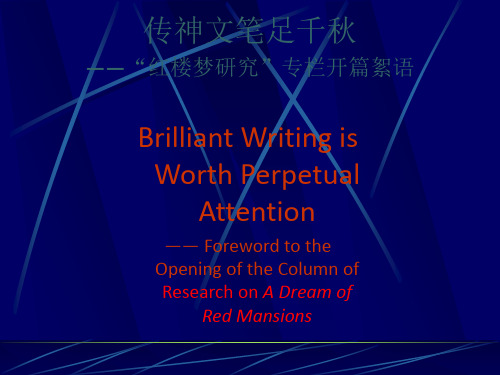
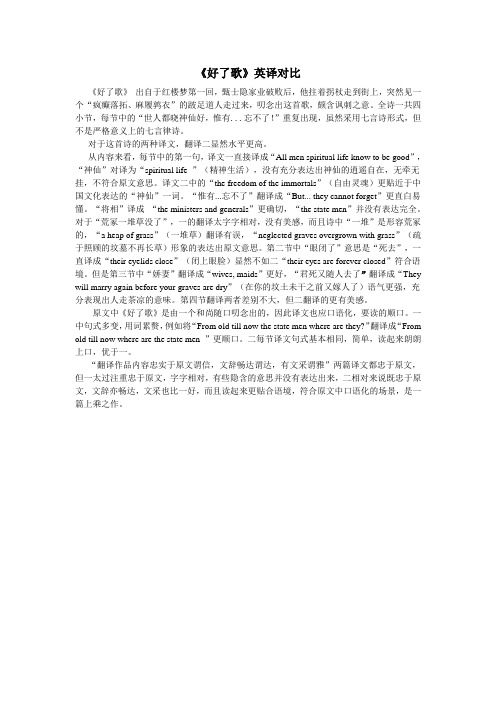
《好了歌》英译对比《好了歌》出自于红楼梦第一回,甄士隐家业破败后,他拄着拐杖走到街上,突然见一个“疯癫落拓、麻履鹑衣”的跛足道人走过来,叨念出这首歌,颇含讽刺之意。
全诗一共四小节,每节中的“世人都晓神仙好,惟有...忘不了!”重复出现,虽然采用七言诗形式,但不是严格意义上的七言律诗。
对于这首诗的两种译文,翻译二显然水平更高。
从内容来看,每节中的第一句,译文一直接译成“All men spiritual life know to be good”,“神仙”对译为“spiritual life ”(精神生活),没有充分表达出神仙的逍遥自在,无牵无挂,不符合原文意思。
译文二中的“the freedom of the immortals”(自由灵魂)更贴近于中国文化表达的“神仙”一词。
“惟有...忘不了”翻译成“But... they cannot forget”更直白易懂。
“将相”译成“the ministers and generals”更确切,“the state men”并没有表达完全。
对于“荒冢一堆草没了”,一的翻译太字字相对,没有美感,而且诗中“一堆”是形容荒冢的,“a heap of grass”(一堆草)翻译有误,“neglected graves overgrown with grass”(疏于照顾的坟墓不再长草)形象的表达出原文意思。
第二节中“眼闭了”意思是“死去”,一直译成“their eyelids close”(闭上眼脸)显然不如二“their eyes are forever closed”符合语境。
但是第三节中“娇妻”翻译成“wives, maids”更好,“君死又随人去了”翻译成“They will marry again before your graves are dry”(在你的坟土未干之前又嫁人了)语气更强,充分表现出人走茶凉的意味。
第四节翻译两者差别不大,但二翻译的更有美感。


用评价理论分析《好了歌》的英译评价理论是对文学作品进行分析和评价的一种方法。
对于《好了歌》的英译,我们可以用以下评价理论进行分析。
1.信号-噪音理论信号-噪音理论认为,对于一份作品,其中的信息和混杂的噪音比例决定了作品的质量。
对于《好了歌》的英译,我们可以考虑译者是否成功传达了原作中的信息,并减少了噪音。
在这个方面,译者表现出色。
他们成功地保持了原作中的情感和意境,将人们难以言喻的复杂情感和细微差异译成了简洁而动人的英文词句。
他们保留了原作中的独特节奏和韵律,增强了诗歌性和音乐感。
然而,有时候也存在一些噪音。
在一些译句中,译者使用了过于直译的方式,导致了词语的表达不够自然流畅。
这可能是由于对于原文意境的理解偏差或对目标语言的不够熟悉所导致的。
译者需要更多的练习和经验来提高这一方面的表现。
2.新批评理论在这个方面,《好了歌》的英译保留了原作中的结构和重要的文化内涵。
译者尊重了原作中的押韵和韵律,并努力将其转化为英文的形式。
他们也试图保留原作中的修辞手法和语言风格,使译文与原作相呼应。
然而,也有一些缺陷。
在译作中,部分修辞手法和隐喻在语言转换过程中失去了原有的威力和效果。
这可能是因为一些文化难以翻译或一些语言间的困难导致的。
译者需要更深入地研究原作和目标语言,以便更好地理解和传达这些细微而重要的因素。
3.接受-批判理论接受-批判理论关注读者对作品的理解和反应。
它认为作品的意义是由读者构建的,不同的读者可能会有不同的解读。
评价作品时,我们需要考虑不同读者的不同反应。
对于《好了歌》的英译,不同的读者可能会有不同的反应。
一些读者可能会欣赏译者成功传达的情感和意境,认为译作深情而动人。
而其他读者可能会感到译作中一些部分的质量不高,导致他们难以完全投入到译作之中。
这再次强调了翻译的主观性和个人化,也表明了译者需要在许多不同方面取得平衡。
他们需要同时考虑文本的形式和意义,译者自己的理解与目标读者的期望,以及原作与目标语言之间的文化差异。
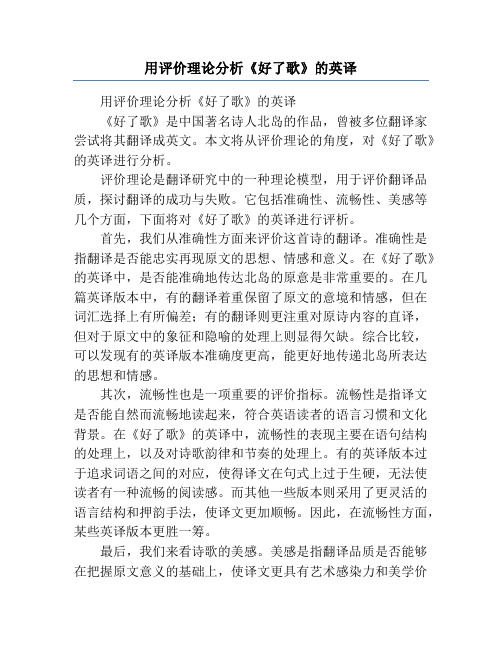
用评价理论分析《好了歌》的英译用评价理论分析《好了歌》的英译《好了歌》是中国著名诗人北岛的作品,曾被多位翻译家尝试将其翻译成英文。
本文将从评价理论的角度,对《好了歌》的英译进行分析。
评价理论是翻译研究中的一种理论模型,用于评价翻译品质,探讨翻译的成功与失败。
它包括准确性、流畅性、美感等几个方面,下面将对《好了歌》的英译进行评析。
首先,我们从准确性方面来评价这首诗的翻译。
准确性是指翻译是否能忠实再现原文的思想、情感和意义。
在《好了歌》的英译中,是否能准确地传达北岛的原意是非常重要的。
在几篇英译版本中,有的翻译着重保留了原文的意境和情感,但在词汇选择上有所偏差;有的翻译则更注重对原诗内容的直译,但对于原文中的象征和隐喻的处理上则显得欠缺。
综合比较,可以发现有的英译版本准确度更高,能更好地传递北岛所表达的思想和情感。
其次,流畅性也是一项重要的评价指标。
流畅性是指译文是否能自然而流畅地读起来,符合英语读者的语言习惯和文化背景。
在《好了歌》的英译中,流畅性的表现主要在语句结构的处理上,以及对诗歌韵律和节奏的处理上。
有的英译版本过于追求词语之间的对应,使得译文在句式上过于生硬,无法使读者有一种流畅的阅读感。
而其他一些版本则采用了更灵活的语言结构和押韵手法,使译文更加顺畅。
因此,在流畅性方面,某些英译版本更胜一筹。
最后,我们来看诗歌的美感。
美感是指翻译品质是否能够在把握原文意义的基础上,使译文更具有艺术感染力和美学价值。
《好了歌》作为一首抒情诗,表达了诗人对现实生活的悲痛和批判,以及对人类未来的期望和渴望。
在英译中,美感的体现主要在语言的美感和意境的再现上。
有的版本能通过精确的词语选择、优美的句式布局以及巧妙的修辞手法使诗歌更富有韵律感和感染力,引发英语读者的共鸣。
而其他一些版本则未能如此成功地再现原诗的美感,导致译文略显平淡。
综上所述,用评价理论分析《好了歌》的英译,我们需要考虑准确性、流畅性和美感等方面。
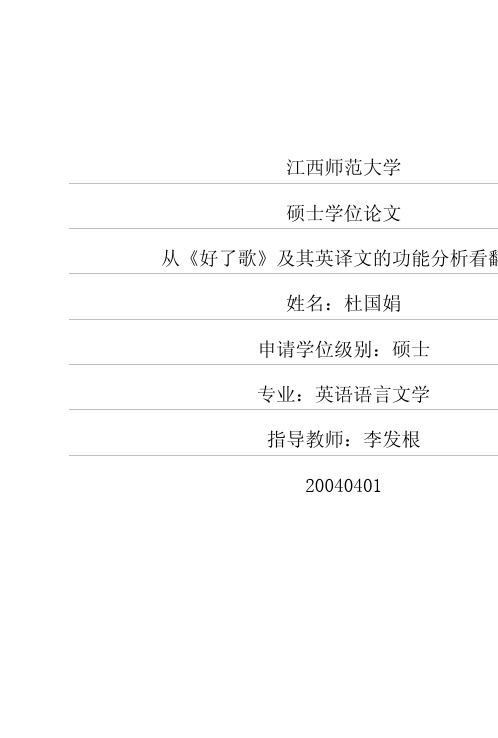
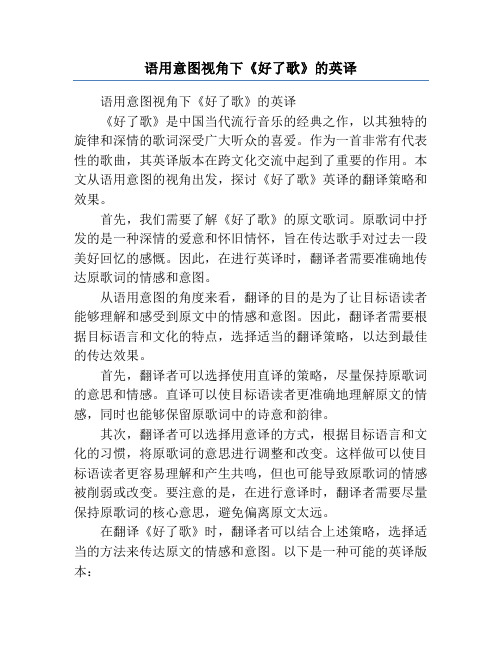
语用意图视角下《好了歌》的英译语用意图视角下《好了歌》的英译《好了歌》是中国当代流行音乐的经典之作,以其独特的旋律和深情的歌词深受广大听众的喜爱。
作为一首非常有代表性的歌曲,其英译版本在跨文化交流中起到了重要的作用。
本文从语用意图的视角出发,探讨《好了歌》英译的翻译策略和效果。
首先,我们需要了解《好了歌》的原文歌词。
原歌词中抒发的是一种深情的爱意和怀旧情怀,旨在传达歌手对过去一段美好回忆的感慨。
因此,在进行英译时,翻译者需要准确地传达原歌词的情感和意图。
从语用意图的角度来看,翻译的目的是为了让目标语读者能够理解和感受到原文中的情感和意图。
因此,翻译者需要根据目标语言和文化的特点,选择适当的翻译策略,以达到最佳的传达效果。
首先,翻译者可以选择使用直译的策略,尽量保持原歌词的意思和情感。
直译可以使目标语读者更准确地理解原文的情感,同时也能够保留原歌词中的诗意和韵律。
其次,翻译者可以选择用意译的方式,根据目标语言和文化的习惯,将原歌词的意思进行调整和改变。
这样做可以使目标语读者更容易理解和产生共鸣,但也可能导致原歌词的情感被削弱或改变。
要注意的是,在进行意译时,翻译者需要尽量保持原歌词的核心意思,避免偏离原文太远。
在翻译《好了歌》时,翻译者可以结合上述策略,选择适当的方法来传达原文的情感和意图。
以下是一种可能的英译版本:好了歌,好了忧伤Goodbye song, goodbye sadness在这个美好的时刻In this beautiful moment我像是游走在空中I feel like I'm floating in the air传达我的心跳Conveying my heartbeat过去的岁月The past years那个温暖的地方That warm place是否还在那里Is it still there?我曾经追寻的梦The dreams I once pursued是否收获何时When will they be rewarded?远离脆弱的泪Far away from fragile tears现在是好的Now it's all good这个英译版本力求保持原歌词的情感和意图,同时做适当的调整以使其符合英语读者的习惯和文化。

从功能对等角度分析《好了歌》的两个英译本【摘要】本文试图从奈达功能对等的角度对《好了歌》的两个英译本在词汇选择和语义层面上进行对比分析,总结两位译者的不同的翻译风格,探究在翻译中的得失。
【关键词】功能对等;词汇;语义一、引言功能对等理论是由尤金・奈达提出的,奈达理论的核心概念是“功能对等”,就是指翻译时不求文字表面的死板对应,而要在两种语言间达成功能上的对等。
当然由于语言和文化之间的差异,在两种语言转换的过程中不可避免会产生偏差,达到完全的对等几乎是不可能的,所以翻译过程中就应该尽量追求译文与原文最大程度上的相似,以实现功能对等。
以译文读者为中心,使得读者对译文的心理反应和接受效果和原文读者对原文的心理反应和接受效果相一致,这才是好的翻译。
在这个理论中,奈达认为“意义是最重要的,形式是其次”,形式很可能掩藏源语的文化意义并阻碍文化交流,如果两者之间产生冲突,那是可以舍弃形式,以突出意义。
这点很适用于文学翻译尤其是诗歌上的翻译。
所以奈达的功能对等理论在翻译过程中能起到很好的导向作用。
本文就以功能对等理论为出发点,从词汇和语义来分析《红楼梦》中的《好了歌》两个英译文不同的翻译风格。
二、《好了歌》两个英译本的对比分析迄今已有9个《好了歌》英译本,其中最具权威和艺术成就的当属我国著名翻译家杨宪益、戴乃迭夫妇的译文和汉学家大卫・霍克斯的译文。
因此,选用这两个具有代表性的英文译本进行对比分析。
2.1词汇在诗歌翻译中,比较难处理的就是对于一些具有特定文化内涵的词语。
由于两种文化之间的差异,有时候很难在两种语言之间找到与之完全相对应的词语,甚至同一个文化意象在不同文化中具有相反的意义,这就为我们在翻译这些词汇时增加了难度。
例1. 世人都晓神仙好All men long to be immortals (杨译)Men all know that salvation should be won (霍译)这句诗中对“神仙”的翻译是关键。

好了歌世人都晓神仙好,惟有功名忘不了!古今将相在何方?荒冢一堆草没了。
世人都晓神仙好,只有金银忘不了!终朝只恨聚无多,及到多时眼闭了。
世人都晓神仙好,只有姣妻忘不了!君生日日说恩情,君死又随人去了。
世人都晓神仙好,只有儿孙忘不了!痴心父母古来多,孝顺子孙谁见了?Won-Done SongMen all know that salvation should be won,But with ambition won’t have done, have done. Where are the famous ones of days gone by?In grassy graves they lie now, every one.Men all know that salvation should be won.But with their riches won’t have done, have done. Each day they grumble they’ve not made enough. When they’ve enough, it’s good night everyone!Men all know that salvation should be won.But with their loving wives they won’t have done. The darlings every day protest their love:But once you’re dead, they’re off with another one.Men all know that salvation should be won,But with their children won’t have done, have done. Y et though of parents fond there is no lack,Of grateful children saw I ne’er a one.(David Hawks 译)All Good Things Must EndAll men long to be immortalsY et to riches and rank each aspires;The great ones of old, where are they now? Their graves are a mass of briars.All men long to be immortals,Y et silver and gold they prizeAnd grub for money all their livesTill death seals up their eyes.All men long to be immortalsY et dote on the wives they've wed,Who swear to love their husband evermore But remarry as soon as he's dead.All men long to be immortalsY et with getting sons won't have done. Although fond parents are legion,Who ever saw a really filial son?(杨宪益、戴乃迭译)。
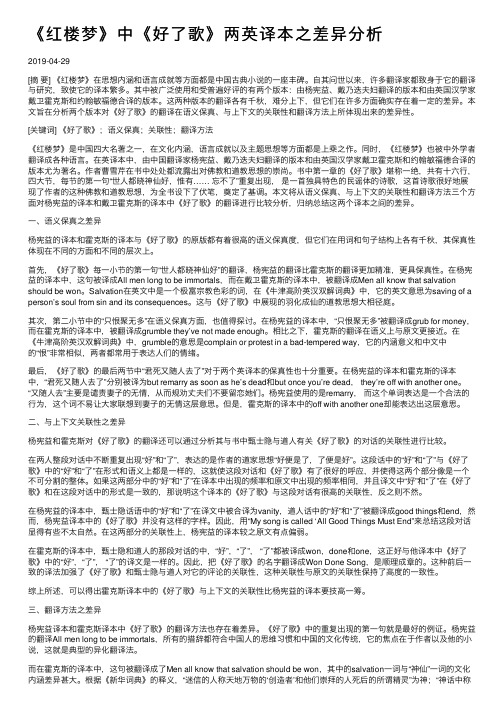
《红楼梦》中《好了歌》两英译本之差异分析2019-04-29[摘要] 《红楼梦》在思想内涵和语⾔成就等⽅⾯都是中国古典⼩说的⼀座丰碑。
⾃其问世以来,许多翻译家都致⾝于它的翻译与研究,致使它的译本繁多。
其中被⼴泛使⽤和受普遍好评的有两个版本:由杨宪益、戴乃迭夫妇翻译的版本和由英国汉学家戴卫霍克斯和约翰敏福德合译的版本。
这两种版本的翻译各有千秋,难分上下,但它们在许多⽅⾯确实存在着⼀定的差异。
本⽂旨在分析两个版本对《好了歌》的翻译在语义保真、与上下⽂的关联性和翻译⽅法上所体现出来的差异性。
[关键词] 《好了歌》;语义保真;关联性;翻译⽅法《红楼梦》是中国四⼤名著之⼀,在⽂化内涵,语⾔成就以及主题思想等⽅⾯都是上乘之作。
同时,《红楼梦》也被中外学者翻译成各种语⾔。
在英译本中,由中国翻译家杨宪益、戴乃迭夫妇翻译的版本和由英国汉学家戴卫霍克斯和约翰敏福德合译的版本尤为著名。
作者曹雪芹在书中处处都流露出对佛教和道教思想的崇尚。
书中第⼀章的《好了歌》堪称⼀绝,共有⼗六⾏,四⼤节,每节的第⼀句“世⼈都晓神仙好,惟有…… 忘不了”重复出现,是⼀⾸独具特⾊的民谣体的诗歌,这⾸诗歌很好地展现了作者的这种佛教和道教思想,为全书设下了伏笔,奠定了基调。
本⽂将从语义保真、与上下⽂的关联性和翻译⽅法三个⽅⾯对杨宪益的译本和戴卫霍克斯的译本中《好了歌》的翻译进⾏⽐较分析,归纳总结这两个译本之间的差异。
⼀、语义保真之差异杨宪益的译本和霍克斯的译本与《好了歌》的原版都有着很⾼的语义保真度,但它们在⽤词和句⼦结构上各有千秋,其保真性体现在不同的⽅⾯和不同的层次上。
⾸先,《好了歌》每⼀⼩节的第⼀句“世⼈都晓神仙好”的翻译,杨宪益的翻译⽐霍克斯的翻译更加精准,更具保真性。
在杨宪益的译本中,这句被译成All men long to be immortals,⽽在戴卫霍克斯的译本中,被翻译成Men all know that salvation should be won。
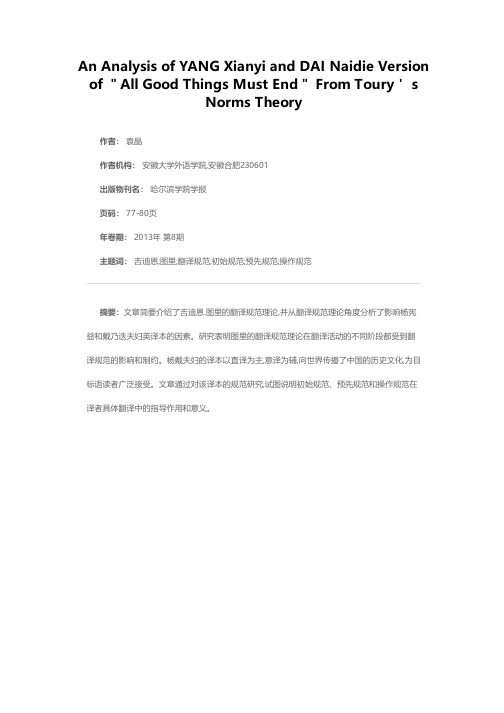
An Analysis of YANG Xianyi and DAI Naidie Version of "All Good Things Must End" From Toury' s
Norms Theory
作者: 袁晶
作者机构: 安徽大学外语学院,安徽合肥230601
出版物刊名: 哈尔滨学院学报
页码: 77-80页
年卷期: 2013年 第8期
主题词: 吉迪恩;图里;翻译规范;初始规范;预先规范;操作规范
摘要:文章简要介绍了吉迪恩.图里的翻译规范理论,并从翻译规范理论角度分析了影响杨宪
益和戴乃迭夫妇英译本的因素。
研究表明图里的翻译规范理论在翻译活动的不同阶段都受到翻
译规范的影响和制约。
杨戴夫妇的译本以直译为主,意译为辅,向世界传播了中国的历史文化,为目标语读者广泛接受。
文章通过对该译本的规范研究,试图说明初始规范、预先规范和操作规范在译者具体翻译中的指导作用和意义。
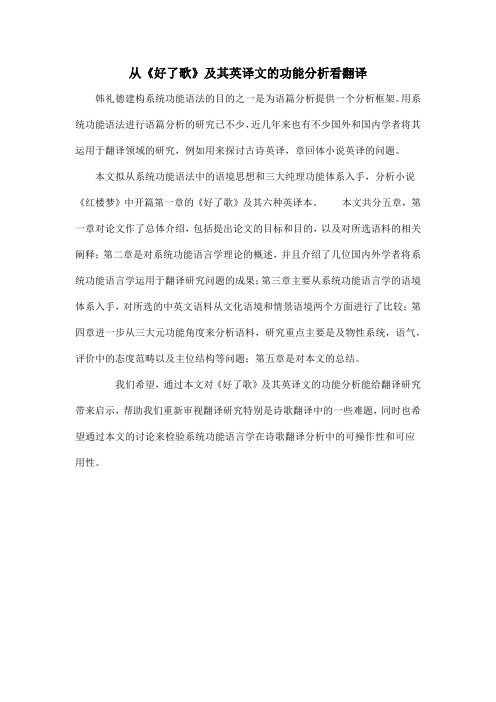
从《好了歌》及其英译文的功能分析看翻译韩礼德建构系统功能语法的目的之一是为语篇分析提供一个分析框架。
用系统功能语法进行语篇分析的研究已不少,近几年来也有不少国外和国内学者将其运用于翻译领域的研究,例如用来探讨古诗英译,章回体小说英译的问题。
本文拟从系统功能语法中的语境思想和三大纯理功能体系入手,分析小说《红楼梦》中开篇第一章的《好了歌》及其六种英译本。
本文共分五章,第一章对论文作了总体介绍,包括提出论文的目标和目的,以及对所选语料的相关阐释;第二章是对系统功能语言学理论的概述,并且介绍了几位国内外学者将系统功能语言学运用于翻译研究问题的成果;第三章主要从系统功能语言学的语境体系入手,对所选的中英文语料从文化语境和情景语境两个方面进行了比较;第四章进一步从三大元功能角度来分析语料,研究重点主要是及物性系统,语气,评价中的态度范畴以及主位结构等问题;第五章是对本文的总结。
我们希望,通过本文对《好了歌》及其英译文的功能分析能给翻译研究带来启示,帮助我们重新审视翻译研究特别是诗歌翻译中的一些难题,同时也希望通过本文的讨论来检验系统功能语言学在诗歌翻译分析中的可操作性和可应用性。

《好了歌》两译文对比评析
言捷智
【期刊名称】《知识经济》
【年(卷),期】2008(000)005
【摘要】本文通过比较《好了歌》的两个英译本,简要讨论霍克斯与杨宪益夫妇在翻译时,基于各自的文化视角,采用不同的处理方式及由此体现的本土化特点。
【总页数】2页(P149-149,95)
【作者】言捷智
【作者单位】衡阳师范学院外语系
【正文语种】中文
【中图分类】H31
【相关文献】
1.《呼啸山庄》两中文译本两段译文对比评析 [J], 段艳丹;罗亚辉
2.《好了歌注》两译文对比评析--兼谈译者的主体性 [J], 刘灵巧
3.红楼梦《好了歌注》两译文对比评析——兼谈译者的文化翻译观 [J], 舒娅
4.翻译之眼看《红楼梦》文眼之眼——《好了歌注》两译文对比分析 [J], 隆玉婷
5.红楼梦《好了歌注》两译文对比评析——兼谈译者的文化翻译观 [J], 舒娅因版权原因,仅展示原文概要,查看原文内容请购买。
好了歌
世人都晓神仙好,惟有功名忘不了!
古今将相在何方?荒冢一堆草没了。
世人都晓神仙好,只有金银忘不了!
终朝只恨聚无多,及到多时眼闭了。
世人都晓神仙好,只有姣妻忘不了!
君生日日说恩情,君死又随人去了。
世人都晓神仙好,只有儿孙忘不了!
痴心父母古来多,孝顺子孙谁见了?
Won-Done Song
Men all know that salvation should be won,
But with ambition won’t have done, have done. Where are the famous ones of days gone by?
In grassy graves they lie now, every one.
Men all know that salvation should be won.
But with their riches won’t have done, have done. Each day they grumble they’ve not made enough. When they’ve enough, it’s good night everyone!
Men all know that salvation should be won.
But with their loving wives they won’t have done. The darlings every day protest their love:
But once you’re dead, they’re off with another one.
Men all know that salvation should be won,
But with their children won’t have done, have done. Y et though of parents fond there is no lack,
Of grateful children saw I ne’er a one.
(David Hawks 译)
All Good Things Must End
All men long to be immortals
Y et to riches and rank each aspires;
The great ones of old, where are they now? Their graves are a mass of briars.
All men long to be immortals,
Y et silver and gold they prize
And grub for money all their lives
Till death seals up their eyes.
All men long to be immortals
Y et dote on the wives they've wed,
Who swear to love their husband evermore But remarry as soon as he's dead.
All men long to be immortals
Y et with getting sons won't have done. Although fond parents are legion,
Who ever saw a really filial son?
(杨宪益、戴乃迭译)。